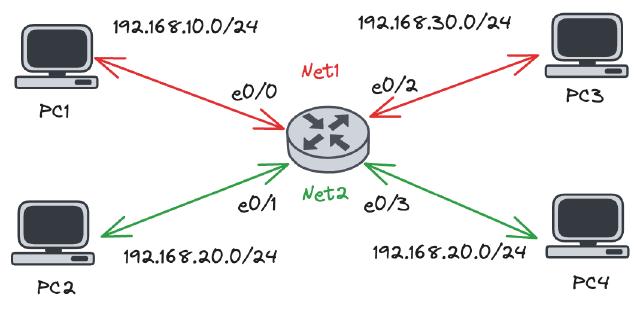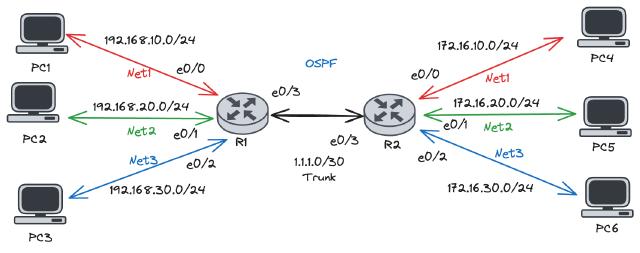Lab#1 - VRF Local

Pada lab kali ini akan melakukan konfigurasi VRF Local dengan membuat dua VRF instance yang berbeda:
- VRF net1 yang terhubung ke interface Ethernet0/0 dan Ethernet0/2
- VRF net2 yang terhubung ke interface Ethernet0/1 dan Ethernet0/3
Configuration
Create VRF Instance
ip vrf net1 ip vrf net2- Tanpa RD (Route Distinguisher) VRF masih bisa berjalan di karenakan pada topologi ini menggunakan konsep VRF Local
Assign VRF Instance to Interface
interface Ethernet0/0 ip vrf forwarding net1 interface Ethernet0/1 ip vrf forwarding net2 interface Ethernet0/2 ip vrf forwarding net1 interface Ethernet0/3 ip vrf forwarding net2Setting IP
interface Ethernet0/0 ip address 192.168.10.1 255.255.255.0 interface Ethernet0/1 ip address 192.168.20.1 255.255.255.0 interface Ethernet0/2 ip address 192.168.30.1 255.255.255.0 interface Ethernet0/3 ip address 192.168.40.1 255.255.255.0
Check the results
Check VRF
router#show ip vrf interfaces Interface IP-Address VRF Protocol Et0/0 192.168.10.1 net1 up Et0/2 192.168.30.1 net1 up Et0/1 192.168.20.1 net2 up Et0/3 192.168.40.1 net2 up router#show ip vrf Name Default RD Interfaces net1 <not set> Et0/0 Et0/2 net2 <not set> Et0/1 Et0/3Ping
# Ping via VRF Net1 router#ping vrf net1 192.168.30.2 Type escape sequence to abort. Sending 5, 100-byte ICMP Echos to 192.168.30.2, timeout is 2 seconds: !!!!! Success rate is 100 percent (5/5), round-trip min/avg/max = 1/1/1 ms router#ping vrf net1 192.168.10.2 Type escape sequence to abort. Sending 5, 100-byte ICMP Echos to 192.168.10.2, timeout is 2 seconds: !!!!! Success rate is 100 percent (5/5), round-trip min/avg/max = 1/1/1 ms router#ping vrf net1 192.168.20.2 Type escape sequence to abort. Sending 5, 100-byte ICMP Echos to 192.168.20.2, timeout is 2 seconds: ..... Success rate is 0 percent (0/5) router#ping vrf net1 192.168.40.2 Type escape sequence to abort. Sending 5, 100-byte ICMP Echos to 192.168.40.2, timeout is 2 seconds: ..... Success rate is 0 percent (0/5) # Ping via VRF Net2 router#ping vrf net2 192.168.20.2 Type escape sequence to abort. Sending 5, 100-byte ICMP Echos to 192.168.20.2, timeout is 2 seconds: .!!!! Success rate is 80 percent (4/5), round-trip min/avg/max = 1/1/1 ms router#ping vrf net2 192.168.40.2 Type escape sequence to abort. Sending 5, 100-byte ICMP Echos to 192.168.40.2, timeout is 2 seconds: .!!!! Success rate is 80 percent (4/5), round-trip min/avg/max = 1/1/1 ms router#ping vrf net2 192.168.10.2 Type escape sequence to abort. Sending 5, 100-byte ICMP Echos to 192.168.10.2, timeout is 2 seconds: ..... Success rate is 0 percent (0/5) router#ping vrf net2 192.168.30.2 Type escape sequence to abort. Sending 5, 100-byte ICMP Echos to 192.168.30.2, timeout is 2 seconds: ..... Success rate is 0 percent (0/5)Traceroute
#Traceroute via VRF Net1 router#traceroute vrf net1 192.168.30.2 Type escape sequence to abort. Tracing the route to 192.168.30.2 VRF info: (vrf in name/id, vrf out name/id) 1 192.168.30.2 0 msec 0 msec 0 msec router#traceroute vrf net1 192.168.20.2 Type escape sequence to abort. Tracing the route to 192.168.20.2 VRF info: (vrf in name/id, vrf out name/id) 1 * * * 2 * * * 3 * * * #Traceroute via VRF Net2 router#traceroute vrf net2 192.168.20.2 Type escape sequence to abort. Tracing the route to 192.168.20.2 VRF info: (vrf in name/id, vrf out name/id) 1 192.168.20.2 0 msec 0 msec 0 msec router#traceroute vrf net2 192.168.30.2 Type escape sequence to abort. Tracing the route to 192.168.30.2 VRF info: (vrf in name/id, vrf out name/id) 1 * * * 2 * * * 3 * * *Check routing table
#Routing table Main router#show ip route Gateway of last resort is not set router#show ip route vrf net1 Routing Table: net1 Gateway of last resort is not set 192.168.10.0/24 is variably subnetted, 2 subnets, 2 masks C 192.168.10.0/24 is directly connected, Ethernet0/0 L 192.168.10.1/32 is directly connected, Ethernet0/0 192.168.30.0/24 is variably subnetted, 2 subnets, 2 masks C 192.168.30.0/24 is directly connected, Ethernet0/2 L 192.168.30.1/32 is directly connected, Ethernet0/2 router#show ip route vrf net2 Routing Table: net2 Gateway of last resort is not set 192.168.20.0/24 is variably subnetted, 2 subnets, 2 masks C 192.168.20.0/24 is directly connected, Ethernet0/1 L 192.168.20.1/32 is directly connected, Ethernet0/1 192.168.40.0/24 is variably subnetted, 2 subnets, 2 masks C 192.168.40.0/24 is directly connected, Ethernet0/3 L 192.168.40.1/32 is directly connected, Ethernet0/3- Table routing global kenapa kosong?, di karenakan ip yang di assing sudah di masukan ke dalam instance VRF yang sudah di tentukan.
Lab#2 - VRF + OSPF

Pada lab kali ini akan melakukan konfigurasi VRF lagi dengan membuat tiga VRF instance yang berbeda. Lalu untuk mengkoneksikan antar networknya menggunakan OSPF VRF di setiap instancenya.
Configuration
Create VRF Instance
#R1 ip vrf net1 rd 1.1.1.1:1 ip vrf net2 rd 1.1.1.1:2 ip vrf net3 rd 1.1.1.1:3 #R2 ip vrf net1 rd 1.1.1.2:1 ! ip vrf net2 rd 1.1.1.2:2 ! ip vrf net3 rd 1.1.1.2:3Assign VRF Instance to Interface
#R1 interface Ethernet0/0 ip vrf forwarding net1 interface Ethernet0/1 ip vrf forwarding net2 interface Ethernet0/2 ip vrf forwarding net3 interface Ethernet0/3.10 ip vrf forwarding net1 interface Ethernet0/3.20 ip vrf forwarding net2 interface Ethernet0/3.30 ip vrf forwarding net3 #R2 interface Ethernet0/0 ip vrf forwarding net1 interface Ethernet0/1 ip vrf forwarding net2 interface Ethernet0/2 ip vrf forwarding net3 interface Ethernet0/3.10 ip vrf forwarding net1 interface Ethernet0/3.20 ip vrf forwarding net2 interface Ethernet0/3.30 ip vrf forwarding net3Setting IP
#R1 interface Ethernet0/0 ip address 192.168.10.1 255.255.255.0 interface Ethernet0/1 ip address 192.168.20.1 255.255.255.0 interface Ethernet0/2 ip address 192.168.30.1 255.255.255.0 interface Ethernet0/3.10 encapsulation dot1Q 10 ip address 1.1.1.1 255.255.255.252 interface Ethernet0/3.20 encapsulation dot1Q 20 ip address 1.1.1.1 255.255.255.252 interface Ethernet0/3.30 encapsulation dot1Q 30 ip address 1.1.1.1 255.255.255.252 #R2 interface Ethernet0/0 ip address 172.16.10.1 255.255.255.0 interface Ethernet0/1 ip address 172.16.20.1 255.255.255.0 interface Ethernet0/2 ip address 172.16.30.1 255.255.255.0 interface Ethernet0/3.10 encapsulation dot1Q 10 ip address 1.1.1.2 255.255.255.252 interface Ethernet0/3.20 encapsulation dot1Q 20 ip address 1.1.1.2 255.255.255.252 interface Ethernet0/3.30 encapsulation dot1Q 30 ip address 1.1.1.2 255.255.255.252Setting Routing OSPF
#R1 router ospf 1 vrf net1 network 1.1.1.0 0.0.0.3 area 0 network 192.168.10.0 0.0.0.255 area 0 router ospf 2 vrf net2 network 1.1.1.0 0.0.0.3 area 0 network 192.168.20.0 0.0.0.255 area 0 router ospf 3 vrf net3 network 1.1.1.0 0.0.0.3 area 0 network 192.168.30.0 0.0.0.255 area 0 #R2 router ospf 1 vrf net1 network 1.1.1.0 0.0.0.3 area 0 network 172.16.10.0 0.0.0.255 area 0 router ospf 2 vrf net2 network 1.1.1.0 0.0.0.3 area 0 network 172.16.20.0 0.0.0.255 area 0 router ospf 3 vrf net3 network 1.1.1.0 0.0.0.3 area 0 network 172.16.30.0 0.0.0.255 area 0
Check the results
Check VRF
#R1 R1#show ip vrf Name Default RD Interfaces net1 1.1.1.1:1 Et0/0 Et0/3.10 net2 1.1.1.1:2 Et0/1 Et0/3.20 net3 1.1.1.1:3 Et0/2 Et0/3.30 R1#show ip vrf interfaces Interface IP-Address VRF Protocol Et0/0 192.168.10.1 net1 up Et0/3.10 1.1.1.1 net1 up Et0/1 192.168.20.1 net2 up Et0/3.20 1.1.1.1 net2 up Et0/2 192.168.30.1 net3 up Et0/3.30 1.1.1.1 net3 up #R2 R2#show ip vrf Name Default RD Interfaces net1 1.1.1.2:1 Et0/0 Et0/3.10 net2 1.1.1.2:2 Et0/1 Et0/3.20 net3 1.1.1.2:3 Et0/2 Et0/3.30 R2#show ip vrf interfaces Interface IP-Address VRF Protocol Et0/0 172.16.10.1 net1 up Et0/3.10 1.1.1.2 net1 up Et0/1 172.16.20.1 net2 up Et0/3.20 1.1.1.2 net2 up Et0/2 172.16.30.1 net3 up Et0/3.30 1.1.1.2 net3 upPing & Traceroute
#R1 R1#ping vrf net1 ip 172.16.10.2 source 192.168.10.1 Type escape sequence to abort. Sending 5, 100-byte ICMP Echos to 172.16.10.2, timeout is 2 seconds: Packet sent with a source address of 192.168.10.1 !!!!! Success rate is 100 percent (5/5), round-trip min/avg/max = 1/1/2 ms R1#traceroute vrf net1 ip 172.16.10.2 source 192.168.10.1 Type escape sequence to abort. Tracing the route to 172.16.10.2 VRF info: (vrf in name/id, vrf out name/id) 1 1.1.1.2 1 msec 1 msec 0 msec 2 172.16.10.2 0 msec 1 msec 0 msec #R2 R2#ping vrf net3 ip 192.168.30.2 source 172.16.30.1 Type escape sequence to abort. Sending 5, 100-byte ICMP Echos to 192.168.30.2, timeout is 2 seconds: Packet sent with a source address of 172.16.30.1 !!!!! Success rate is 100 percent (5/5), round-trip min/avg/max = 1/1/2 ms R2#traceroute vrf net3 ip 192.168.30.2 source 172.16.30.1 Type escape sequence to abort. Tracing the route to 192.168.30.2 VRF info: (vrf in name/id, vrf out name/id) 1 1.1.1.1 1 msec 0 msec 0 msec 2 192.168.30.2 0 msec 0 msec 1 msecOSPF
#R1 R1#show ip ospf neighbor Neighbor ID Pri State Dead Time Address Interface 172.16.30.1 1 FULL/BDR 00:00:31 1.1.1.2 Ethernet0/3.30 172.16.20.1 1 FULL/BDR 00:00:39 1.1.1.2 Ethernet0/3.20 172.16.10.1 1 FULL/BDR 00:00:31 1.1.1.2 Ethernet0/3.10 #R2 R2#show ip ospf neighbor Neighbor ID Pri State Dead Time Address Interface 192.168.30.1 1 FULL/DR 00:00:38 1.1.1.1 Ethernet0/3.30 192.168.40.1 1 FULL/DR 00:00:39 1.1.1.1 Ethernet0/3.20 192.168.10.1 1 FULL/DR 00:00:38 1.1.1.1 Ethernet0/3.10Check routing table
#R1 R1#show ip route vrf net1 Routing Table: net1 Gateway of last resort is not set 1.0.0.0/8 is variably subnetted, 2 subnets, 2 masks C 1.1.1.0/30 is directly connected, Ethernet0/3.10 L 1.1.1.1/32 is directly connected, Ethernet0/3.10 172.16.0.0/24 is subnetted, 1 subnets O 172.16.10.0 [110/20] via 1.1.1.2, 00:03:13, Ethernet0/3.10 192.168.10.0/24 is variably subnetted, 2 subnets, 2 masks C 192.168.10.0/24 is directly connected, Ethernet0/0 L 192.168.10.1/32 is directly connected, Ethernet0/0 #R2 R2#show ip route vrf net2 Routing Table: net2 Gateway of last resort is not set 1.0.0.0/8 is variably subnetted, 2 subnets, 2 masks C 1.1.1.0/30 is directly connected, Ethernet0/3.20 L 1.1.1.2/32 is directly connected, Ethernet0/3.20 172.16.0.0/16 is variably subnetted, 2 subnets, 2 masks C 172.16.20.0/24 is directly connected, Ethernet0/1 L 172.16.20.1/32 is directly connected, Ethernet0/1 O 192.168.20.0/24 [110/20] via 1.1.1.1, 00:03:46, Ethernet0/3.20
